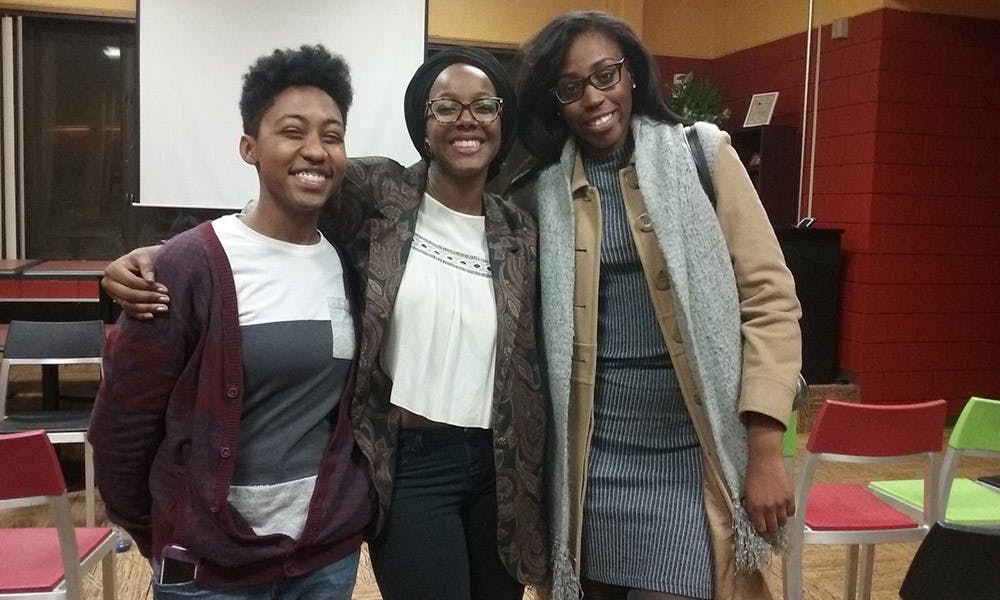For Aisha Abdelmula, the words “Black Lives Matter” are more than just a hastag – they represent a worldwide movement.
Abdelmula, a second-year graduate student in the higher education student affairs administration program, recently created a film called “Do Black Lives Matter on Campus?: Student Leaders Speak on Activism and Inclusivity at a Predominately White Campus.”
Her film follows five black UB students and their involvement in the “Black Lives Matter” movement and their lives as black students on campus.
“Black Lives Matter” is a movement that rallies against violence and injustice toward black people based on their race. The movement gained national recognition after the deaths of Michael Brown and Eric Garner – both black men killed by police in 2014.
“The film is about how the ‘Black Lives Matter’ movement translates to their work on campus, how they see themselves and how they are affirmed,” Abdelmula said.
Abdelmula held a public event to show the film to people and chose the opportunity to deliver a statement.
“I hope the film makes you happy, because of how resilient and brave these students are despite all the things that have happened to them as a result of different acts of interpersonal violence they have experienced,” Abdelmula said to the audience. “I also hope it makes you angry because of how we don’t do enough to support them so they have to face these acts of violence.”
Looking back on the film, Abdelmula said she hopes viewers realize that, as a society and a university, people do not do enough asking when considering students’ well-being.
“We need to stop making decisions for students without their voice,” Abdelmula said.
Many people who are not involved in the movement, she said, have inaccurate thoughts and assumptions regarding the movement.
“I think people hear ‘Black Lives Matter’ and think, ‘They’re not talking about me, this must be something that’s wrong,’” Abdelmula said. “When people go to a breast cancer walk, they don’t say, ‘What about lung cancer,’ because that would be ridiculous.”
Isaiah Davis, a senior English and philosophy major who starred in the film, was raised by a family from the “deep south.”
“As a black man and furthermore a black student, these issues have everything to do with me,” Davis said in an email. “My livelihood and that of those around me are always at stake in today’s world.”
Abdelmula wants people who are unfamiliar with the issues surrounding the “Black Lives Matter” movement to take advantage of all the information they have at their fingertips.
She said people have so much knowledge at their hands but refuse to do their own personal work. She said she thinks many prefer to ask a friend of a different race about things that affect them.
“No one can speak for any entire group unless the group of the population is one person,” Abdelmula said.
On-campus spots such as the Office of Student Engagement and the Intercultural and Diversity Center are available for all students to learn about diversity.
Abdelmula said finding these resources is just a single step in the process of becoming more aware of racial and cultural issues in the world.
She said, however, understanding oneself should precede that.
“You can’t serve or understand others unless you understand yourself and your biases and assumptions about other works, or how you came to obtain your knowledge,” Abdelmula said.
Davis said he hopes to send a message to UB students with the film.
He said people should not get mad when those who choose a course of action create outcomes they do not like.
“Wake up. After you wake up, find your resolve,” Davis said. “If you try to ignore the issues, it is still a decision nonetheless.”
Although this was Abdelmula’s first film, she said she doesn’t plan on stopping there. Abdelmula is currently considering how the experience impacted those involved with the film. Before embarking on that journey, she plans on submitting her film to the Racial Justice Conference in Western New York in April.
Abdelmula said she wants to stay in touch with some of the themes in the film such as multiculturalism and access. She ultimately plans on helping create more access and inclusivity for black students in particular, but also those who are marginalized or underrepresented in colleges.
Kori Hughes is a news staff writer and can be reached at news@ubspectrum.com.





